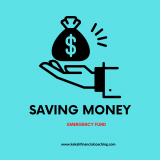One thing life guarantees are emergencies! As John Lennon once said, “life is what happens to you while you’re busy making other plans.” If we look back in history during the housing crisis in 2008 and as recent as the 2020 pandemic, we can definitely draw some lessons out of these circumstances. According to the Federal Reserve in 2020, about 36% of Americans cannot cover a $400 emergency. Ironically, that number has improved compared to 2013 when it was 50% of Americans who could not cover a $400 emergency. Unfortunately, that percentage goes up as the emergency amount increases. The purpose here is to encourage you to not be part of this jaw dropping statistic. It is critical to have a safety net between you and what life throws at you.
What is an emergency fund?
Also known as rainy-day fund, an emergency fund is simply money set aside to assist in an unexpected event such as the loss of a job, medical emergency, or a car accident.
Impulse buying of a new car, taking a vacation, or going out on a steak dinner are not reasons for utilizing an emergency fund. These are things that you plan for well in advance or use discretionary money and not your rainy-day fund.
Do we really need it?
The short and quick answer is YES, everyone needs an emergency fund. This nugget is for the everyday person. Unless you consider yourself as the Warren Buffett or the Jeff Bezos of this world, you don’t want to be caught in a precarious position with your pants down in the absence of a rainy-day fund. We already know it’s a matter of time before an emergency is going to happen. Imagine the frustration and pain if one has a very stressful event without an emergency fund. This will also prevent you from getting into unnecessary situations like using credit cards or high-interest loans.
What is the right amount to save?
There are different suggestions on how much to have in an emergency fund by different financial ‘gurus’ out there. If starting out you should have at least $500 – $1000 in an emergency fund and begin building from there to accumulate 3-6 months of your monthly expenses. The 3 months emergency fund is ideal for individuals or households with a very stable job situation. Meanwhile, the 6 months emergency savings will be better for those with an unstable job situation or managing chronic health issues for example. Having an emergency fund may seem like a daunting task but taking small steps at a time will help ease the pain. Some of the ways to build up your emergency fund over time is to:
- Allocate an amount of money every paycheck into your emergency savings account.
- Utilize your tax refund.
- Automatically move money from your checking into your emergency savings account.
- Get a ‘side gig’ or a part time job for extra income.
- Sell the things you no longer need online or have a garage sale.
Where is a great place to save your emergency fund?
One might be tempted to invest the emergency fund in the stock market but that should be advised against as the funds need to be readily accessible and available in case of an emergency. As we have seen in recent times, the stock market can be volatile (goes up and down) and depending on the investment account, pulling the money out could take a couple of days and possibly generate a capital gains tax situation. A great place to park your emergency fund will be at an online high yield savings account or money market account. In case of any emergency, the money would be readily available and accessible in at least a day through withdrawal or transfer. An online high yield savings account is also good because it is FDIC insured up to $250,000 per person or $500,000 as a couple and it also earns more interest than a traditional bank.
What are you gonna do about it?
Now that you are in the KNOW, take the opportunity and start saving your emergency fund, if you have not already done so. It is inevitable that the car will break down, the hot water heater might go out, the washer or dryer might go bad, but with an emergency fund this will be a blip and will be addressed with more ease. The danger of not having a rainy-day fund if an emergency happens can put you in a deep financial hole, which could be difficult to climb out depending on your financial situation.
If you are ready and willing to make some changes in your personal finance CLICK HERE and sign up for a free 30 minutes consultation call. Follow us on Instagram and Facebook where you can draw some great inspirations from a cluster of amazing ‘Power Quotes‘.
Get out of debt, build wealth and enjoy life.

